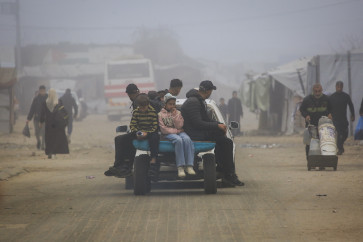Popular Reads
Top Results
Can't find what you're looking for?
View all search resultsPopular Reads
Top Results
Can't find what you're looking for?
View all search resultsIndonesia and the World 2010 (Part 2 of 2)
Indonesia's preoccupation with various global challenges in 2010 will not be at the expense of its commitment to contribute to peace, stability and prosperity of its own region - Southeast Asia
Change text size
Gift Premium Articles
to Anyone
I
ndonesia's preoccupation with various global challenges in 2010 will not be at the expense of its commitment to contribute to peace, stability and prosperity of its own region - Southeast Asia.
Almost mirroring Indonesia's democratic transformation over the past decade, the period since 2003 when Indonesia last held the Chairmanship of ASEAN, has witnessed ASEAN's own evolution towards an ASEAN Community.
This development has not been an accident. For Indonesia, the evolution of an ASEAN that is more alert to democratic principles and good governance is critical to ensure that there would not be a disconnect or divide between the transformation that has taken place within Indonesia and the regional milieu.
In 2010, with the Charter in place, ASEAN has all the Community which we all aspire by 2015. The urgency of concrete action by ASEAN cannot be underestimated.
In the broader region, the past year saw renewed interest in the idea of an East Asia or Asia-Pacific wide regional architecture.
Renewed because for Indonesia it is a debate that we had anticipated by forging ahead with the concept of an ASEAN Community. For Indonesia, there cannot be an East Asian community or an Asia Pacific without an ASEAN Community as its core constituent.
Thus, the ASEAN Community, the various "ASEAN +" processes, the ARF, APEC and East Asia Summit constitute a multi-pronged path towards an East Asia community with ASEAN playing a central role. This is a vision that will continue to guide us in 2010.
A notable emphasis, however, is the need to ensure that nationally, within our own borders, Indonesia itself is ready, including in terms of its national connectivity, in order to fully benefit from the regional community-building efforts.
Our global and regional diplomatic efforts will be underpinned by solid bilateral diplomacy.
In keeping with the tagline "one thousand friends, zero enemies", our foreign policy in 2010 will actively seek to raise to a higher level existing ties with countries in all corners of the globe - the Asia-Pacific, Africa, Europe and the Americas. In this connection, besides the promotion of positive political and people-to-people relations, there will be renewed and focused efforts to promote economic diplomacy.
The promotion of trade, investment and tourism is critical to ensure that foreign policy brings tangible contribution to our development efforts. The foreign policy machinery will be galvanized for this purpose.
A special focus for our efforts will be in border diplomacy - namely to make headway in addressing outstanding border delineation and demarcation issues with neighboring states through negotiations.
Not least, foreign policy in 2010 will also be cognizant of so called "intermestic issues" - those which reflect the blurring of boundaries between international and domestic issues. One such issue is the question of protection of our nationals overseas, principally Indonesian workers overseas.
Indonesian foreign policy will strive to ensure a better recognition that there is natural mutually beneficial relationship between the host country and the sending country: that each Indonesian worker is after all making contribution to the country in which he/she finds employment, while conversely earning their living.
This fact must find better manifestation in the manner in which the responsibilities and rights of workers overseas are recognized. Indonesian foreign policy in 2010 will strive to ensure that the necessary legal frameworks are in place.
Above all, however, Indonesian foreign policy, indeed, each and every Indonesian diplomat, will continue to be imbued with the principles of partiality towards and protection for Indonesian nationals - without exception.
One issue that is also likely to continue to preoccupy is the efforts to overcome terrorism. Indonesia's foreign policy in 2010 will continue employing bilateral, regional and global efforts to overcome this threat.
It will also continue to address the so-called conditions conducive or root causes of terrorism. Inter-faith dialogue through bilateral, regional and inter-regional cooperation will be at the forefront of our diplomacy. Indeed, the entire spectrum of "soft power" will occupy a central place in our foreign policy.
I am of the firm view that to be effective, foreign policy demands a strong sense of ownership and participation by the stakeholders. Thus, democratization of Indonesian foreign policy will be key. On the one hand, this of course, relates to substance.
Indonesian foreign policy as we begin this second decade of the 21st century must reflect the democratic transformation within. However, it also relates to process. The foreign policy machinery must be open to interaction with stakeholders and, above all to new ideas and opportunities. The partnership and engagement with the DPR (the House of Representatives), more specifically its Commission I, is especially valued and critical. Foreign policy and diplomacy unites.
I do genuinely believe that Indonesian foreign policy stands at a cross road. We have an opportunity to take Indonesia's international role to another level. A country engaged constructively in its own region and at the same time able to contribute significantly to global issues and concerns.
Such a role, of course, must be earned through the quality of our diplomacy. Through the contribution of the men and women who make up our diplomatic machinery, whose dedication and hard work I wish to acknowledge today.
Above all, through the support and partnership of all stakeholders. Insya Allah (God willing).
The writer is Minister for Foreign Affairs of the Republic of Indonesia. The article is an abridged version of the minister's annual policy statement on Jan. 8, 2010.










